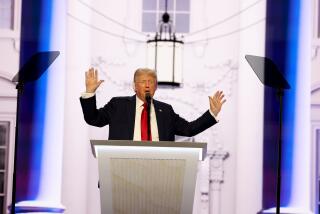Reagan Applauded in Congress, Even by Some of His Critics
- Share via
WASHINGTON — President Reagan, applauded for more than three minutes even before he started speaking, ended his Geneva summit with a triumphal address to Congress on Thursday night, winning the approval of even some persistent critics of his Administration.
Although some political leaders, both in and out of Congress, complained that Reagan and Soviet leader Mikhail S. Gorbachev made very little progress on arms control, the President generally won high marks for warming the atmosphere of U.S.-Soviet relations.
There was agreement that Reagan avoided most of the pitfalls that could have turned the meeting into a fiasco. Liberals praised Reagan for purging his rhetoric of references to the Soviet Union as an “evil empire,” and conservatives generally seemed reassured that he did not give away too much in his first meeting with the Soviet party chief.
House Speaker Thomas P. (Tip) O’Neill Jr. (D-Mass.) was particularly effusive. “I’m more than delighted, of course, that they’re going to continue talking,” O’Neill said. “As long as we are sitting across the table, . . . there is always a possibility of agreement.”
Speaking more cautiously, Sen. Edward M. Kennedy (D-Mass) said in a statement, “Perhaps this summit could have gone better, but it could also have gone worse.”
Sen. Sam Nunn (D-Ga.) even found a silver lining in the failure of Reagan and Gorbachev to agree on any specific arms control measures.
Conducive to Progress
“I think they made significant progress on (improving the U.S.-Soviet) atmosphere, and that atmosphere improvement is conducive to substantive progress on arms control,” said Nunn, the senior Democrat on the Armed Services Committee and one of the most influential members of Congress on military matters.
“We have more cards to play right now than we will have in the months and years ahead,” he said. “I think we have the best opportunity we have had in a long time for serious and substantial cutbacks in Soviet missiles and warheads.”
But he cautioned that progress in reducing offensive weapons will depend on U.S. willingness to enter “serious discussions of defense. . . . I’m not saying it’s time to make a trade for SDI (Reagan’s controversial Strategic Defense Initiative). That’s too simplistic, but defenses and offenses have to be discussed together.”
Gerard C. Smith, the chief arms control negotiator in the Administration of former President Richard M. Nixon, sounded one of the few notes of criticism.
“It seems to be very thin on arms control,” he said. “. . . It looks to me as if (Defense Secretary Caspar W.) Cap Weinberger’s advice (to avoid a commitment to continue observing the unratified SALT II agreement) was taken by the President.”
Smith, who negotiated the first Strategic Arms Limitation Treaty in 1972, added, “The test will be on Jan. 1, when someone asks the President if he will continue not to undercut SALT II. If he says ‘yes,’ that would be a pretty healthy sign.”
The SALT II pact, signed by former President Jimmy Carter and the late Soviet President Leonid I. Brezhnev in 1978, expires at the end of this year. It never officially took effect because the Senate did not ratify it, but both Washington and Moscow have agreed not to “undercut” its provisions.
In their joint appearance after the summit, Reagan and Gorbachev did not commit themselves to continue that policy.
Harold Brown, secretary of defense in the Carter Administration, said Reagan and Gorbachev apparently did not narrow their differences on the President’s missile defense program, commonly known as “Star Wars.”
“There is every sign that Ronald Reagan is determined to hold to his dream of SDI and there is every sign that Gorbachev holds to his dream of stopping it,” Brown said in an interview with CBS News.
The House Democratic leadership, in a statement issued after a special late-afternoon meeting, said: “The discussions in Geneva have begun the important process of reducing tensions between the United States and the Soviet Union. . . . We had hoped for more substantive progress in arms control, human rights and regional conflicts.”
‘Out of Deep Freeze’
Rep. Dante B. Fascell (D-Fla.), chairman of the House Foreign Affairs Committee, was more cautious, however. He said: “Relations between the superpowers are out of the deep freeze but not out of the cold--or out of danger. . . . The coming months will determine whether the summit will be known for its failures or successes. There is clearly a long way to go before an enduring improvement in relations can be identified.”
But Senate Foreign Relations Committee Chairman Richard G. Lugar (R-Ind.) said the importance of a warming in relations should not be understated.
“When this year started, it was sort of touch and go,” Lugar said. “You’ve got an awful lot there to deal with that wasn’t there a year ago. There must be an awful sense of relief among people all over the world.”
Referring to the President, Lugar said: “I don’t think his mistrust of the Soviets has been totally disabused. But, on the other hand, I think he’s prepared to see where this thing will go. My guess is that he will continue to have his own very deep thoughts about the Soviet Union--and those haven’t changed a whole lot. People who were worried about him giving away the store at Geneva probably didn’t have a whole lot to worry about.”
A Hopeful Beginning’
Senate Majority Leader Bob Dole (R-Kan.) called the summit “a hopeful beginning.” He said the meeting would be judged a success if it led to “negotiations which we hope will become more comprehensive and bring more concrete progress in the future.”
More to Read
Get the L.A. Times Politics newsletter
Deeply reported insights into legislation, politics and policy from Sacramento, Washington and beyond. In your inbox twice per week.
You may occasionally receive promotional content from the Los Angeles Times.










